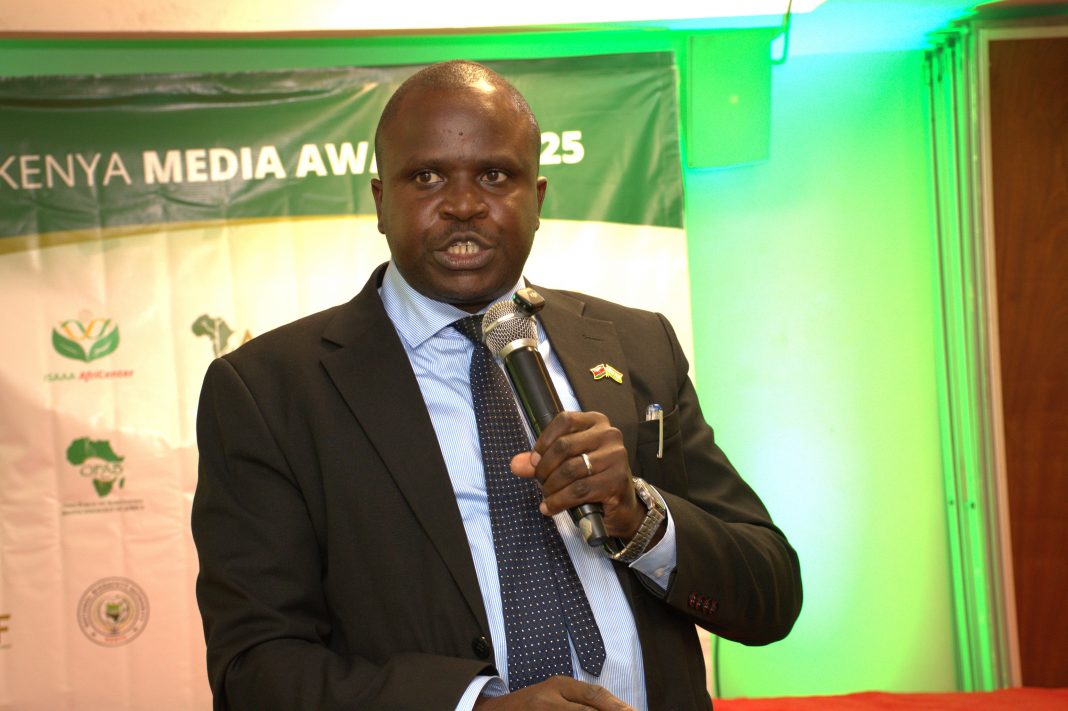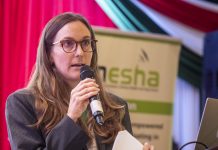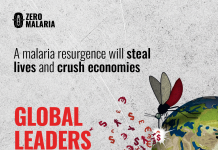By Milliam Murigi
The National Biosafety Authority (NBA) has pledged to deepen collaboration with the media to enhance accurate and responsible reporting on biotechnology and biosafety in Kenya.
Speaking during the Open Forum on Agricultural Biotechnology (OFAB) Kenya Media Awards 2025 held in Kenya’s capital, Nairobi, Nehemiah Ngetich, the Acting Chief Executive Officer of NBA, said journalists play a pivotal role in shaping public understanding of biotechnology innovations — including genetically modified organisms (GMOs), genome editing, and biosafety regulations.
“Facts are not optional; they are the safety rails that guide policy, regulation, and innovation,” said Ngetich. “When reporters bring accuracy, clarity, and context to complex topics such as genome editing, GM crops, and biosafety monitoring, they equip citizens and decision-makers to engage with evidence rather than rumors.”
He noted that misinformation around biotechnology continues to undermine public trust, stressing the need for journalists to rely on verified data and scientific evidence.
Ngetich commended science journalists for their efforts in demystifying complex scientific topics, saying their work contributes directly to policy quality, responsible innovation, and public confidence.
“Clear and balanced reporting helps the public separate scientific facts from misinformation. Evidence-based narratives elevate policy discussions and help regulators like the NBA to operate with transparency,” he added.
Ngetich said that to strengthen this collaboration, the NBA will continue to make its technical experts available to journalists for background briefings and on-record insights on regulation, risk assessment, lab testing, and compliance processes.
This, he said, will help ensure stories are both timely and technically sound, and that the public receives accurate interpretations of biosafety developments.
He further noted that the Authority will deepen partnerships with media organizations and training institutions to build the capacity of journalists on biosafety fundamentals, terminologies, and regulatory pathways.
According to him, strengthening journalists’ understanding of biosafety will enable them to interpret and communicate complex scientific information in simple and relatable ways that the public can easily grasp.
In addition, Ngetich said NBA will continue to improve how it communicates updates on product approvals, post-release monitoring, stakeholder engagement, and laboratory capacity. The goal, he explained, is to make primary and credible information more accessible to journalists and the public, promoting transparency and trust in the regulation of biotechnology in Kenya.
On her part, Dr. Margaret Karembu, Director of the International Service for the Acquisition of Agri-biotech Applications (ISAAA) AfriCenter, lauded journalists for their continued commitment to providing factual, balanced, and evidence-based information. She warned that the growing wave of misinformation threatens public trust in science and could derail technological progress.
“We are staring at one of the greatest calamities of our time, where science is under attack,” said Dr. Karembu. “Misinformation and disinformation have been classified by the World Economic Forum as the next pandemic—second only to the climate crisis. We must fight this war on science misinformation and defend science through accurate reporting.”
She emphasized that journalists are key allies in ensuring that policymakers and the public have access to the right information and evidence to make informed decisions.
“Our progress has not been without challenges. Despite clear scientific evidence and a robust regulatory framework, adoption of smart biotech solutions in agriculture continues to face opposition fueled by misinformation and emotive narratives around safety, trade, and the environment,” she said.
Dr. Karembu urged journalists to continue using their platforms to amplify scientific facts and highlight innovations that can address Africa’s food security challenges.







